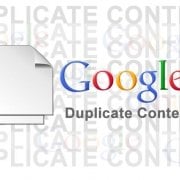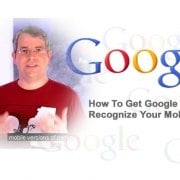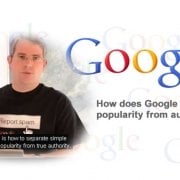Google Video About Paid Links – teamdiscovery.eu
Google put out a new 8-minute video about paid links. Matt Cutts talks about the various things that the search engine takes into consideration when determining whether or not links are “paid”.
99 percent of the time it’s abundantly clear, he says. Sometimes, not so much.
He notes, “These are some of the criteria, but just like the webspam guidelines, they basically say, ‘Look, anything that’s deceptive or manipulative or abusive we reserve the right to take action on.’ It’s the same sort of thing. If we see a new technique that people are trying to exploit people’s trust or something like that, we’re willing to take action on that as well.”
He points out that the FTC and other government agencies have guidelines about disclosure, and that Google’s thinking is pretty much aligned with these.
One thing Google takes into consideration is the actual value of what someone is getting for something.
“If you go to a conference, and you pick up a free t-shirt that’s probably pretty low-quality, that’s probably not going to change how you behave, right?” Cutts says. “That’s not going to change your behavior. On the other hand, if someone pays you outright $600 to link to you, that is clearly a lot of value. So on the spectrum of a pen and a t-shirt all the way up to something of great value, that’s one of the criteria that we use. Another good one is how close is something to money? So again, the vast majority of the time, people are actually giving you money. Sometimes people might say something like, ‘Hey, I’d like to send you a gift card. Gift cards are pretty fungible. You can convert those to money and back and forth not too easily. On the other hand, something like ‘I’m going to give you a free trial of perfume’ or ‘I’m going to buy you a beer’ or something like that,” that’s less of a connection. But we do look at how close something is to actual money whenever we’re looking at those kinds of things.”
“If someone goes and buys you dinner, and you write a blog post four months later, and the dinner wasn’t some huge steak dinner with eighteen courses or something like that, that’s probably not the sort of thing that we would worry about.”
I’d be curious to know how they’d go about figuring that out anyway. It’s unclear exactly how many courses it takes.
“Another criterion that we use is whether something is a gift or a loan,” he continues. “So imagine, for example, that somebody loaned out a car for someone to try out for a week versus giving them a car. There’s a big difference there because if you’re loaned a car for a week you still have to maintain the insurance on your car, you still have to make sure you have a place to store it , whereas if someone gives you a new car, that is something of a completely different nature. So if somebody’s giving you a review copy, and you have to return it, that’s a relatively well-respected thing where people understand, “Okay, I’m trying this out. I’m a gadget reviewer or whatever, and I get to see whether I like this camera or whatever, but I do have to send it back. Whereas if someone sends you a camera, and says, ‘Oh, you know what? Just keep it,” that’s going to be something that’s much closer to material compensation in our opinion.”
“We also look at the intended audience, and it can be hard to judge intent, but bear in mind, the vast majority of the time, the intent is crystal clear when someone’s giving you actual money to buy links, but take for example, suppose someone went to a Salesforce conference. You know, so they’re at Dreamforce, and they represent a nonprofit, and so they manage to say, ‘Okay, I’m a nonprofit, and I like to try out your service,’ and so at Salesforce conference or Dreamforce, they got a year’s free use of the service. Now, the intent there was not to get someone to embed paid links within an editorial blog post. The intent was to try to sign somebody up, see how they liked it….they can be someone who could tell other people about it…maybe it’s a subscription or a trial where they get six months free, and then after that they either have to convert or start paying money or something along those lines. That is something where the intent is not trying to get links for SEO value. It’s so that people can try it out.”
Cutts then goes on to compare such a scenario to Google giving out gadgets at Google I/O – something critics have often pointed out when this discussion comes up.
“Another thing to consider is whether or not it would be a surprise,” he says. “So if you’re a movie reviewer, it’s not a surprise that somebody probably lets you into a theater, and maybe you watch the movie for free. That’s not something that’s going to be a surprise. If it was a reporter for a tech blog, and they said, ‘Give me a laptop, and I get to keep it,’ that would be a surprise…and it would be something that was not reviewing the laptop. Just like, “I’d write about your startup if you give me a laptop.’ That would be the sort of thing that really should be disclosed.”
In the end, you probably know if what you’re doing is wrong, but it’s really also about whether Google perceives what you’re doing to be wrong. Hopefully, this will give you a better idea of what to expect on their end.









